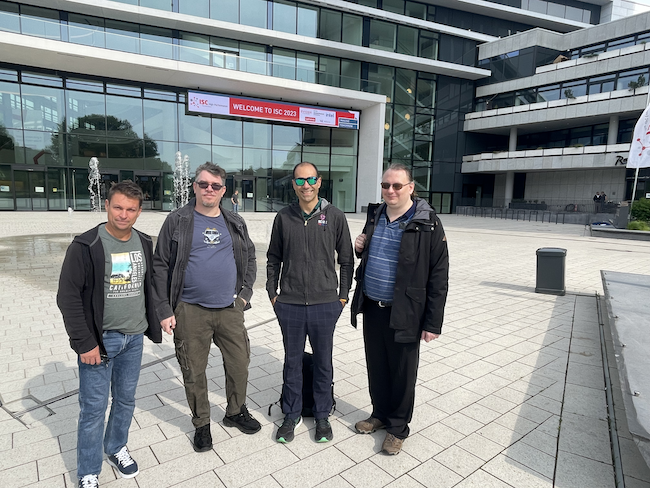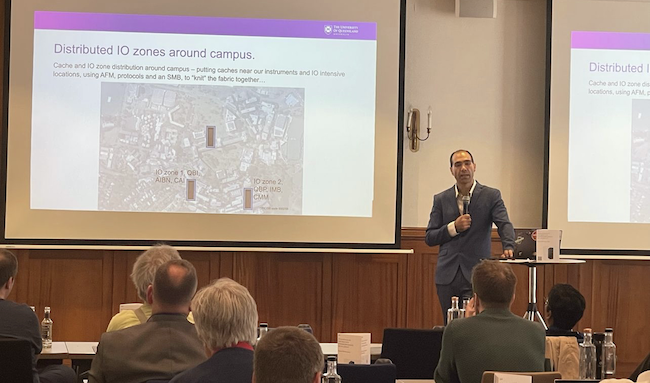Two RCC staff attended the International Supercomputing Conference (ISC 2023) in Hamburg, Germany last month.

RCC Chief Technology Officer Jake Carroll and RCC Senior Systems Administrator Ashley Wright were at the conference from 21–25 May alongside more than 3,300 other attendees.
ISC is the largest gathering of supercomputing practitioners, academics, researchers and technology suppliers in Europe. It is second in scale only to the IEEE ACM Supercomputing Conference held annually in the United States.
On Sunday, 20 May, before the conference officially began, Jake represented the Asia-Pacific region on the Dell HPC Community Day Sustainability panel.
The next day, Jake gave a presentation at the IBM Storage Scale User Group meeting on UQ and RCC's storage strategy, current challenges and upcoming projects. RCC and IBM work closely together as part of the IBM@UQ Centre of Excellence.
On Wednesday, 23 May, Jake and Ashley met with IBM's Storage Product executives and technical leadership team. In this 13-person round table session, they mapped out current challenges, planned work for the year ahead and developed goals in both storage and compute technologies.
Across the five days of the conference, Jake and Ashley attended other technology partner meetings, lectures, focus groups, Birds of Feather (BoF) talks, and panels to gain an insight and understanding of key trends in the industry that will shape the year ahead in research and advanced computing.
Read Jake’s report below about the technology trends at the conference.
Technology trends at ISC 2023
By Jake Carroll, RCC Chief Technology Officer
A theme that continues through this year in almost all the keynote presentations, many of the BoF's and most vendor discussions was that energy consumption matters. It is becoming a critical factor in decision-making processes for how to buy, build and operate research computing infrastructure and supercomputing facilities. The sector is becoming very serious about reducing energy consumption.
Another very clear, but perhaps contentious message, is that hyperscale corporations now dominate the hardware design conversation. A few giant companies (Meta, Google, Amazon and Microsoft) appear to control hardware direction, fabrication and interconnect innovation. The number of companies willing to invest in building Exascale supercomputers is dwindling.
A key message shared by experts was that whilst the advanced computing community no longer has the financial ability to compete in the hardware design or engineering markets, alone, it does contribute innovative thinking, research problems that need solving and a willingness to drive change in implementation.
It is likely, in my opinion, that the future of supercomputing looks more like a co-design opportunity in conjunction with the hyperscalers, as opposed to supercomputing centres and researchers finding ways to build new CPUs or GPUs.
The rise of alternative architectures continues, with CPU technology company Arm dominating discussions. This year, the use of Arm in high-performance computing is less aspirational and more real as more diverse silicon options near production availability.
The main benefit Arm providers are promoting is that users will be able to do at least the same amount but use less power in the process.
In a world where the need for computing power is outstripping the ability to cool systems, coupled with environmental and sustainability concerns, these alternative CPU architectures are becoming important.
Finally, on the subject of software and hardware trends, several speakers suggested that researchers should rethink computational pipelines and hardware choice. By doing so, researchers may take advantage of heterogeneous hardware architectures.
In real terms for researchers, this might involve using accelerator technologies, application specific hardware and CPUs together in one workload. If researchers are to believe the claims of hardware and software vendors, this will be facilitated through high-level frameworks that abstract hardware-specific coding, leaving compilers and systems to decide where best to run each piece of code. Supercomputer users may see performance gains, power consumption and efficiency improvements and hopefully a better time to solution.
Some examples in kilometer-scale resolution weather forecasting shown this year at ISC 2023 included entire computationally intensive simulation codes being replaced by AI-type solvers, which produced a result that was as good, and in some cases better than what the original solver generated. This resulted in a speed-up of the execution of the task, but also saved power due to the use of pre-trained models.




